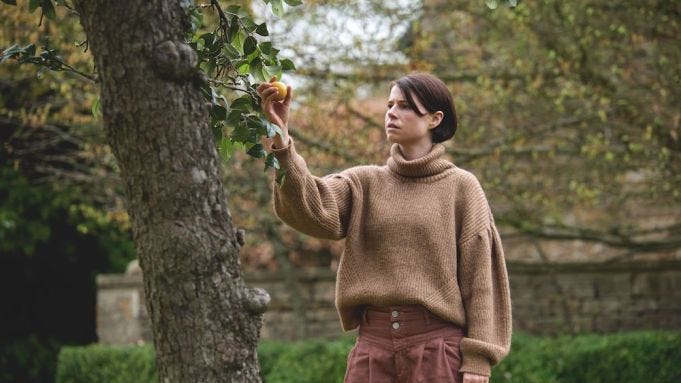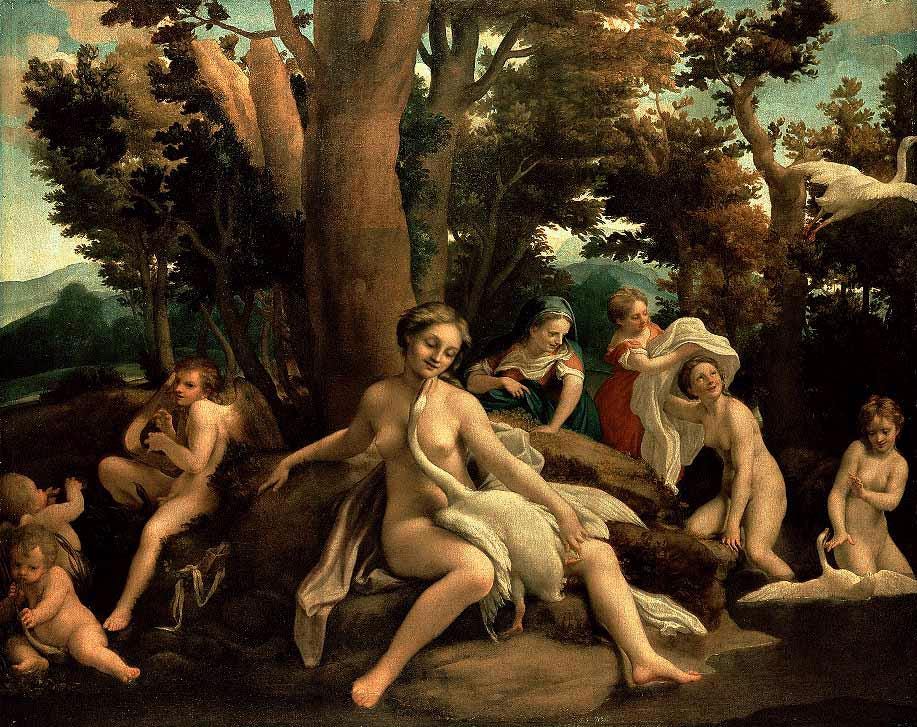To Understand Alex Garland's Men, You Have to Understand This Yeats Sonnet
A24's folk horror flick holds the Irish poet's 1924 poem about rape, Greek mythology, and the genealogy of trauma at its core.

I had a theater to myself—main aisle, center recliner seat, six months pregnant—when I went to see Alex Garland’s Men the other day. The experience of the film began before I even entered the theater.

Why? Because unlike demons and ghosts (depending on who you ask), the scary subject of Men is a creature that daily walks among us. You know—men. As much as I might like to leave the horrors that I witnessed in the theater at the door, I can’t. I exist within the confines of the duality hetero women face: men are a threat to me, and yet I have been romantically involved with them all my life.
Sometimes the threats are small: almost every time I go out for a run, a man shouts something at me. Sometimes they’re bigger: men in the workplace talk down to me and denigrate my education, particularly older men. Others are huge—I’ve been groped in bars by male strangers (and male acquaintances) more times than I can count. I could go on, but I won’t.
And here I sit, involved in a loving relationship with a man, potentially even carrying a male child. The horror is at home, so to speak. Men are real, and many of them are dangerous. This is life as a woman, and it’s the context in which Alex Garland’s Men operates.
If you’re not familiar with the work of W. B. Yeats, you’ll miss out on one of the film’s deeper arguments about male violence.
If you’re not familiar with the work of W. B. Yeats, you’ll miss out on one of Men’s deeper arguments about male violence. Critics seem split on Garland’s film: many seem confused, are convinced that the film doesn’t earn its ending, or believe it doesn’t go far enough to condemn toxic masculinity and patriarchy. But a deeper understanding of the poem that one of the many men of Men quotes in a key scene allows us to see it for the straightforward but still emotionally affecting condemnation of misogyny that it is.
CW: Rape, sexual violence, and spoilers.
The Film
Harper (Jessie Buckley) rents a manor in the English countryside to heal from a tragedy that we slowly learn about through flashbacks. What was supposed to be a respite turns into a nightmare as the various men she meets in the manor’s village and nearby forest menace and harm her psychologically and, later, physically. Every man in the film is played by Rory Kinnear, a brilliant bit of symbolic, fairytale-esque visual poetry.
Harper’s negative interactions with men begin with small, misogynist microaggressions: manor owner Geoffrey inquiring about her “hubby” and telling her not to flush tampons down the 500-year-old house’s toilets. A local boy with an unsettlingly adult face (Kinnear’s face, to be exact, superimposed on a child) calls her a “stupid bitch.” But the aggressions escalate quickly to flashing, gaslighting, stalking, breaking and entering, and, eventually, attempted rape.
What begins to feel like an atmospheric slasher film eventually swerves into what it really is: a surrealist piece of sublime folk horror. Impossible things begin to happen, and during the most emotionally heightened scene, one of the male characters recites poetry.
The Sonnet
During the scene in which the victim-blaming vicar corners Harper in an upstairs room before assaulting her, he recites part of W. B. Yeats’s poem, “Leda and the Swan,” first published in 1924.
The poem describes an event from Greek mythology in which Zeus, in the form of a swan, rapes Leda, a Spartan princess. Leda later gives birth to Helen (of Troy), Clytemnestra, and twins Castor and Pollux. Yeats’s poem depicts the rape itself, then moves on to the interesting territory of history and power.

“Leda and the Swan” is a sonnet. I’ve discussed the basic features of this form elsewhere on PopPoetry, but as a brief recap, notice the 14-line structure and the way the poem turns or shifts after the first eight lines. Here it is in its entirety:
Leda and the Swan A sudden blow: the great wings beating still Above the staggering girl, her thighs caressed By the dark webs, her nape caught in his bill, He holds her helpless breast upon his breast. How can those terrified vague fingers push The feathered glory from her loosening thighs? And how can body, laid in that white rush, But feel the strange heart beating where it lies? A shudder in the loins engenders there The broken wall, the burning roof and tower And Agamemnon dead. Being so caught up, So mastered by the brute blood of the air, Did she put on his knowledge with his power Before the indifferent beak could let her drop? —W. B. Yeats
The first eight lines describe the swan descending upon Leda and her bodily reaction to the bird-god. Notice that Yeats mainly describes Leda’s body and its sensations rather than her thoughts. The words “helpless” and “terrified” are applied in a third-person context: we don’t get any of her interiority. Leda has no agency, here.
In lines 5–8, the speaker asks some chilling questions: How could Leda push the swan away, knowing its divine power? How could she help but feel its heartbeat? The speaker hints at the possibility that some part of her was moved by the encounter or even titillated. It might have seemed provocative 100 years ago, but in today’s context, these questions just feel like a misogynist She wanted it. I don’t find it provocative to wonder if a woman being raped is enjoying the encounter, even if that encounter is with a god.
Victims of sexual violence are part of a long, horrific chain of violence that has been and will continue to be.
But lines 9–11 look forward in time to the eventual violence that will germinate from this violent act: the destruction wrought by the Trojan War and the death of Agamemnon, commander of the Greek forces during the war. This is the sonnet’s “turn” from the current moment to the future. When the speaker asks, “Did she put on his knowledge,” he’s asking, was there some part of Leda that could sense the future violence that will be a product of this rape? Perhaps there is some sense in victims of violence that they are part of a long, horrific chain of violence that has been and will continue to be. Keep this in mind when we come to the end of the film.
The Film
In Men, Garland asks us to see male fantasies that lay blame on women for the sexual violence of men as the ridiculous projections that they are.
Harper asks, “What are you?!”
The vicar replies, “A swan.”
The vicar begins his own recitation of the poem at the moment of ejaculation during the rape: “A shudder in the loins…” If you know Yeats, you know, then, that the vicar is announcing both his intention to rape her and his status as a god (whether literally or metaphorically is up to your interpretation of the film) by reciting the poem.
The world of horror can do anything, but what does the big bad intend to do at this moment? Exactly what men just do in the real world every day: He intends to rape her. It’s almost banal, and Harper’s affect shows this. Some viewers have commented that this feels like a failure on the part of the acting/directing, but I choose to interpret it as a choice Garland made to comment on the banality of male sexual violence.
The vicar continues to menace Harper and prepares to assault her, pacing around like an animal about to strike. As this grotesque one-man stage play proceeds, Harper asks, “What are you?!”
The vicar replies, “A swan.”

If we are to understand the vicar as the metaphorical swan/Zeus, we can think of the many shape-shifting men of Men (the vicar, the boy, the cop, the landlord, and the green man) as different permutations of the same male force, the force of domination and history, the force of Zeus. Even the way the vicar wraps his split hand around harper and enfolds her in his arms as he pins her down is reminiscent of many artistic treatments of Leda being overpowered by the swan. Harper is not at fault for her partner’s death, or for the lustful thoughts the vicar has. He’s practically turning himself inside out (wait for the ending) in attempting to justify his sexual domination of her. That’s Garland’s critique.
Harper can’t simply “get over” the trauma of her husband’s coercive suicide threats because her husband is just one man in a world of men who use women for their own ends.
“Leda and the Swan” isn’t just about sexual violence: Yeats viewed the rape of Leda as the initiation of the modern era and likely saw parallels to Ireland’s political situation at the time, but the main point here is that Leda is used as a mere instrument for male domination and progress. That’s why the poem is in the film, and that’s the situation Garland is attempting to highlight. Harper can’t simply “get over” the trauma of her husband’s coercive suicide threats because her husband is just one man in a world of men who use women for their own ends.
In her review of the film, Vulture’s Angelica Jade Bastién touched on the banality inherent to the film’s shocking and disgusting ending sequence:
Men’s ending is marked by violence and gore to extreme degrees, involving the destruction of flesh and expectations. This should have been chilling, piercing even. Instead, as it drew out, I felt unmoved and distant.
The ending, steeped in birth and rebirth imagery that is both male and female made me, too, feel unmoved and distant, but I think that’s kind of the point. Watching the men of Men rebirth themselves into hideous new versions that all seek to exploit and pillage Harper is downright banal. Harper even looks a bit bored as these births take place because, we understand, this exploitation has been evergreen since the myth of Leda. That men turn themselves inside out to continue their abuse is par for the very difficult course.
Male violence is self-engendering, and surmounting one particular male does not surmount the whole of the patriarchy. Men, amirite? That’s the punchline and the horror of the film’s title and its message. A deeper understanding of Yeats’ “Leda and the Swan” gives us a better sense of how far back Garland is asking us to look when it comes to patriarchy, domination, and male violence.







This is a fantastic analysis of Men. I just finished the movie and am so disturbed, haunted, and moved. I wanted to learn more about the poem and the vicar's reference to being a "swan," and yours was the first movie review I discovered. I'm astounded you don't have more likes on this post, and can only hope you published this review in numerous other places.
I know you don't need the approval of some rando on the interwebs. So I hesitated to comment. But, mainly, I just wanted to say thank you.
Hello! I'm a professor of a small liberal arts college and I'm teaching the movie men right now and I'd love to use this article because it's so great!